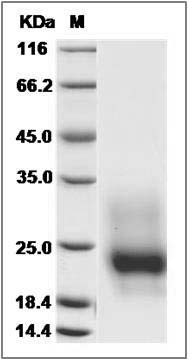-
Product Name
Mouse GM-CSF / CSF2 (His Tag) recombinant protein
- Documents
-
Description
Granulocyte-macrophage colony-stimulating factor (GM-CSF) is one of an array of cytokines with pivotal roles in embryo implantation and subsequent development. Several cell lineages in the reproductive tract and gestational tissues synthesise GM-CSF under direction by ovarian steroid hormones and signalling agents originating in male seminal fluid and the conceptus. The pre-implantation embryo, invading placental trophoblast cells and the abundant populations of leukocytes controlling maternal immune tolerance are all subject to GM-CSF regulation. GM-CSF stimulates the differentiation of hematopoietic progenitors to monocytes and neutrophils, and reduces the risk for febrile neutropenia in cancer patients. GM-CSF also has been shown to induce the differentiation of myeloid dendritic cells (DCs) that promote the development of T-helper type 1 (cellular) immune responses in cognate T cells. The active form of the protein is found extracellularly as a homodimer, and the encoding gene is localized to a related gene cluster at chromosome region 5q31 which is known to be associated with 5q-syndrome and acute myelogenous leukemia. As a part of the immune/inflammatory cascade, GM-CSF promotes Th1 biased immune response, angiogenesis, allergic inflammation, and the development of autoimmunity, and thus worthy of consideration for therapeutic target. GM-CSF has been utilized in the clinical management of multiple disease processes. Most recently, GM-CSF has been incorporated into the treatment of malignancies as a sole therapy, as well as a vaccine adjuvant. While the benefits of GM-CSF in this arena have been promising, recent reports have suggested the potential for GM-CSF to induce immune suppression and, thus, negatively impact outcomes in the management of cancer patients. GM-CSF deficiency in pregnancy adversely impacts fetal and placental development, as well as progeny viability and growth after birth, highlighting this cytokine as a central maternal determinant of pregnancy outcome with clinical relevance in human fertility.
-
Protein name
Granulocyte-macrophage colony-stimulating factor
-
Protein short names
MGI-IGM; MGC138897; CSF2; GM-CSF; MGC151255; MGC151257; CSFGM; MGC131935; GMCSF
-
Uniprot ID
P01587
-
Gene Name
Csf2; Csfgm
-
Source/Expression Host
Human Cells
-
Expression Plasmid/cDNA
A DNA sequence encoding the mouse CSF2 (P01587) (Ala18-Lys141) was expressed with a polyhistidine tag at the N-terminus.
-
Protein Species
Mouse
-
Molecular weight
The recombinant mouse CSF2 consists of 144 amino acids and predicts a molecular mass of 16.5 KDa. It migrates as an approximately 23 KDa band in SDS-PAGE under reducing conditions.
-
Purity
> 95 % as determined by SDS-PAGE
-
Activity
Measured in a cell proliferation assay using FDC-P1 cells.
The ED50 for this effect is typically 0.04-0.2 ng/mL. -
Validations

Mouse GM-CSF / CSF2 Protein (His Tag) SDS-PAGE
Related Products / Services
Please note: All products are "FOR RESEARCH USE ONLY AND ARE NOT INTENDED FOR DIAGNOSTIC OR THERAPEUTIC USE"
